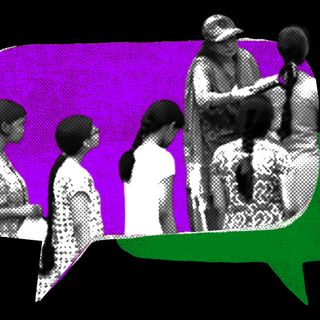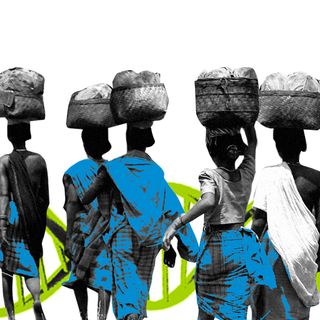
A Bus Stop Bench in Kerala Was Cut to Prevent Men and Women From Sitting Together
The incident shows how people’s moral anxieties around sexual expression are so high that men and women merely interacting freak them out.

A rather bizarre incident from Kerala attests to the misplaced notions of morality we hold as a society — and how there seem to be no limits the moral police isn’t willing to cross when it comes to enforcing them. Earlier this week, students of the College of Engineering, Thiruvananthapuram (CET) were surprised to find the long steel bench at a bus stop, where they often used to hang out, had been cut into threesingle seats. Reportedly, local residents were irked by male and female students sitting together in public, and took it upon themselves to prevent the affront to their sensibilities.
“We heard that the seating changes were made by one of the residential associations,” Ankitha Jazy, a representative of CET College Union, told The News Minute. “Even when we hang out around the college, many of them behave intolerantly… Apart from this, the residents around the college have called [the] police to the spot several times seeing students waiting there, even for genuine reasons like transportation. This has been causing huge distress to the students.”
When inquired, however, the residents told authorities that they cut the bench simply to enforce social distancing. But given that their history with the college students suggests otherwise, no one — including the mayor of the city, Arya Rajendran — seems to trust their statement completely. “The seat near CET being cut into three is inappropriate and unbecoming of a progressive society. There is no ban on girls and boys sitting together in our country. If anyone thinks so, they need to consider that they are living in the bullock cart age. I congratulate the students for strongly protesting against the issue,” Rajendran opined.
The students’ clap-back, meanwhile, won them widespread support on the internet. Choosing not to bend to the diktats of conservatism, they decided to hold a “sit-on-lap” protest; they sat on each other’s laps on the single seats that the steel bench had been divided into.
Related on The Swaddle:
Women Participate Less in Interactive College Classes Due to Fear of Peer Judgment: Study
The incident, however, is telling of several things at once: the notions of purity that sanskaari people must adhere to and the anxiety around unmarried women being intimate with men. But more evidently, it speaks to how social mores and prejudices can very swiftly translate into changes in the public sphere — altering infrastructure and ideologies alike. The action of the residents also speaks to the way desire and sexuality exist in the public domain, and how it’s possible to alter its landscape purely by the force of social taboos.
It’s important to unpack these concerns that couch themselves under the desire to maintain a “respectable society.” Arguably, society’s moral anxieties have been soaring lately. Just last month, an allegedly married, heterosexual couple was violently beaten for sharing a harmless kiss while bathing in Ayodhya’s Saryu river. As Saumya Kalia had commented in The Swaddle, “The anxieties around [public display of affection] are well documented and apply best to unmarried partners in relationships outside the heteronormative binary. But people, falling within the conventional mold of a family, could inspire an ire so violent, then, betrays the deeply embedded unease around sex and desire in the first place.”
Needless to mention, being conditioned by these anxieties, especially in the absence of sex education, forces people to grow up with a toxic — or, at times, even a criminal — outlook towards sex, besides forcing many to develop sexual repression.
Unfortunately — but rather unsurprisingly — women often pay the price for society’s moral anxieties around sexual expression that are so easily triggered. As a result, 44% of educational institutions in India had different rules for men and women, as a report from 2014 by the University Grants Commission (UGC) found. Rather than admitting to the fragility of their conservative sensibilities, institutions tend to justify the discriminatory policies on the pretext of women’s safety — by imposing dress codes on female students, restricting their access to libraries beyond specified hours, and preventing them from participating in outdoor sports or even ordering food from outside.
Related on The Swaddle:
Rather than giving students an opportunity to break out of the toxic constructs of gender and sexuality that they may have been exposed to while growing up — so they can freely form their own opinions in a non-judgemental space — colleges often choose to thus police their bodies, and by extension, their minds.
In 2016, in fact, the Centre had to explicitly restrict institutes of higher education from imposing disparate rules for students based on their gender, stating: “Concern for the safety of women students must not be cited to impose discriminatory rules for women in hostels as compared to male students… It is the responsibility of the institutions to ensure [the] safety of women [on] campus. But this does not mean you curtail their freedom.”
But, evidently, if the hands of institutions themselves are thus tied, the moral police take it upon themselves to restore “order” by destroying public infrastructure and harassing students. The irony might just be lost on them. “Remember we are referring here to young adults who have already finished their schooling and are not children anymore… [I]n other parts of the modern world adult students, may they be women or men, who attend universities live a normal life without such backward restrictions. They take responsibility for their academic achievements and personal freedom,” noted a 2018 op-ed in The Hindu Businessline.
At present, Rajendran has promised to build the students a WiFi-enabled bus stop that would be expressly termed “gender neutral.” The residents might not be too happy about it, butit’s high time they overcame their biases, or at the very least, stopped compelling everyone else to subscribe to their ideas of morality.
Devrupa Rakshit is an Associate Editor at The Swaddle. She is a lawyer by education, a poet by accident, a painter by shaukh, and autistic by birth. You can find her on Instagram @devruparakshit.
Related


In Conversation: On Bras and Entrance Exams
